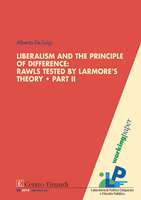- Ricerche e Progetti
- Biblioteca della Libertà
- Pubblicazioni e Working Paper
- Articoli e media
- Eventi e notizie
Working papers LPF
2015
Liberalism and the Principle of Difference: Rawls Tested by Larmore’s Theory. Part II
WP-LPF 2/15
- Categoria/Category
- WP-LPF 2015
- Autore/Author
- Alberto De Luigi
- Editore/Publisher
- Centro Einaudi
- Luogo/City
- Torino
- Articolo completo/Full text
- WP-LPF_2_2015_De Luigi.pdf
Abstract
John Rawls’ Political Liberalism (1993) is considered a turning point in the theory of the famous author, but certain elements of his theory, as they were presented in his previous work A Theory of Justice (1971), might appear unclear under a liberal perspective, in particular with regard to the interpretation of the highly debated difference principle. In the first part of this paper—published in this WP-LPF Series—, it is exposed the theory of political liberalism, with particular attention to the concept of neutrality as formulated by Charles Larmore; this precedes the analysis of the principles of justice in Rawls’ philosophy: an important aim of this work is to offer a key to understand the revision of Theory, which can be found reading Charles Larmore’s Patterns of Moral Complexity (1987), a book also studied and commented by Rawls. Starting from the common elements which bind the two said authors, it is explained why Rawls borrows a lot from the theory of the younger philosopher, even underlining the references they make to each other’s works. The whole second part would focus on this thesis: how the difference principle, as proposed by Rawls in A Theory of Justice, could conform itself to the features of political liberalism theory.







